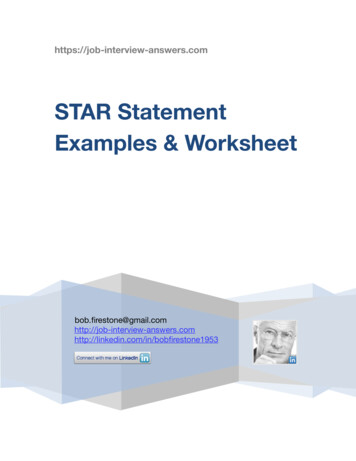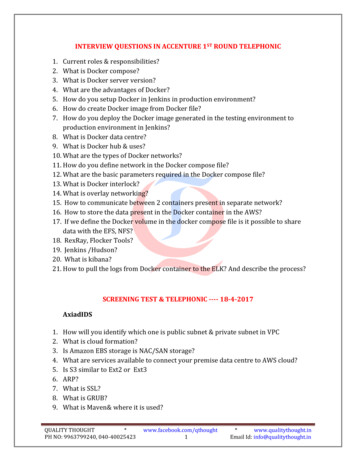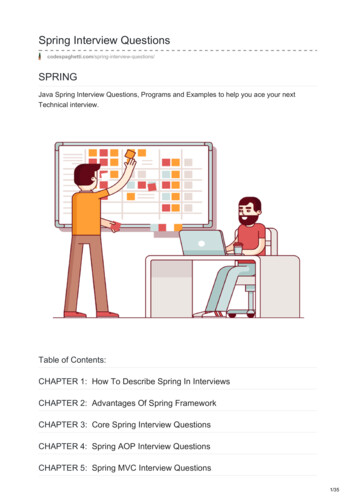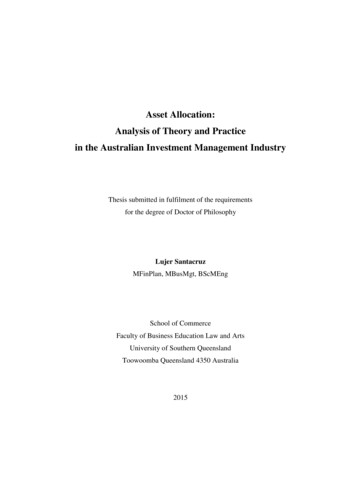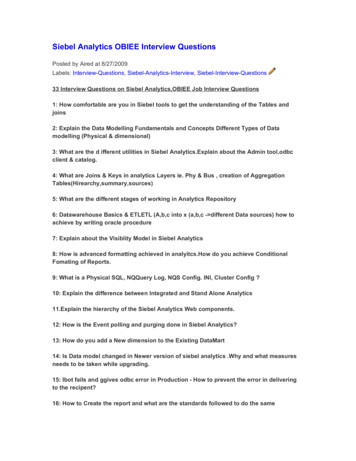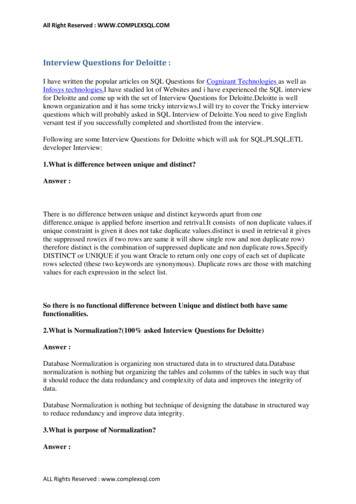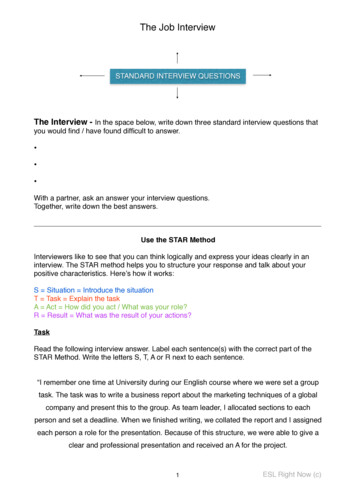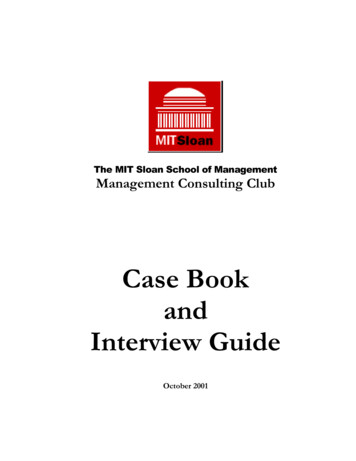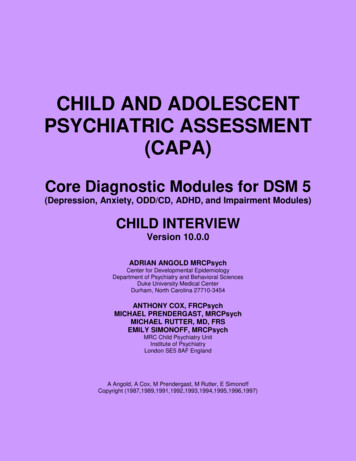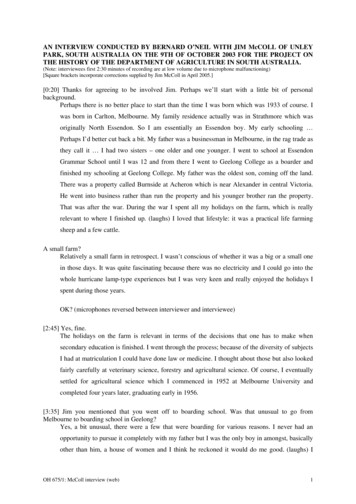
Transcription
AN INTERVIEW CONDUCTED BY BERNARD O’NEIL WITH JIM McCOLL OF UNLEYPARK, SOUTH AUSTRALIA ON THE 9TH OF OCTOBER 2003 FOR THE PROJECT ONTHE HISTORY OF THE DEPARTMENT OF AGRICULTURE IN SOUTH AUSTRALIA.(Note: interviewees first 2:30 minutes of recording are at low volume due to microphone malfunctioning)[Square brackets incorporate corrections supplied by Jim McColl in April 2005.][0:20] Thanks for agreeing to be involved Jim. Perhaps we’ll start with a little bit of personalbackground.Perhaps there is no better place to start than the time I was born which was 1933 of course. Iwas born in Carlton, Melbourne. My family residence actually was in Strathmore which wasoriginally North Essendon. So I am essentially an Essendon boy. My early schooling Perhaps I’d better cut back a bit. My father was a businessman in Melbourne, in the rag trade asthey call it I had two sisters – one older and one younger. I went to school at EssendonGrammar School until I was 12 and from there I went to Geelong College as a boarder andfinished my schooling at Geelong College. My father was the oldest son, coming off the land.There was a property called Burnside at Acheron which is near Alexander in central Victoria.He went into business rather than run the property and his younger brother ran the property.That was after the war. During the war I spent all my holidays on the farm, which is reallyrelevant to where I finished up. (laughs) I loved that lifestyle: it was a practical life farmingsheep and a few cattle.A small farm?Relatively a small farm in retrospect. I wasn’t conscious of whether it was a big or a small onein those days. It was quite fascinating because there was no electricity and I could go into thewhole hurricane lamp-type experiences but I was very keen and really enjoyed the holidays Ispent during those years.OK? (microphones reversed between interviewer and interviewee)[2:45] Yes, fine.The holidays on the farm is relevant in terms of the decisions that one has to make whensecondary education is finished. I went through the process; because of the diversity of subjectsI had at matriculation I could have done law or medicine. I thought about those but also lookedfairly carefully at veterinary science, forestry and agricultural science. Of course, I eventuallysettled for agricultural science which I commenced in 1952 at Melbourne University andcompleted four years later, graduating early in 1956.[3:35] Jim you mentioned that you went off to boarding school. Was that unusual to go fromMelbourne to boarding school in Geelong?Yes, a bit unusual, there were a few that were boarding for various reasons. I never had anopportunity to pursue it completely with my father but I was the only boy in amongst, basicallyother than him, a house of women and I think he reckoned it would do me good. (laughs) IOH 675/1: McColl interview (web)1
think it did. I quite enjoyed it. I was very much into the sport as well as did reasonably wellacademically. I was the opening fast bowler in the cricket and captain of football and captain ofathletics and that sort of thing so I really enjoyed it.So sporting interests.Yes, sporting interests and they sort of kicked on.Did you have any interests at boarding school with the land? You mentioned the farm connection.Only that not only did I continue holidays on the farm but I actually towards the later years Ihad some friends – one who came from Western District, a grazing property, and another onejust outside of Wagga, two particular friends, so I spent some holiday vacations on those typesof properties. That probably also supported and guided my eventual decision to do agriculturalscience. I suppose in a sense I didn’t have the money to go farming so agricultural science wasa second best! (laughs)How long did the farm remain in family hands?Actually it was sold in the late 1950s, early 1960s by my uncle and then he bought anotherproperty which was a dairy farm closer to Alexander on the Goulburn River Flats. He died inhis 60s so that’s when the family virtually pulled out of ownership of land, out of the farm.During the university period did you go back to the farm during the holidays or had you grown out ofthat?No. I’d probably grown out of that. And, of course, the second year (you asked aboutRoseworthy) well the second year of the Melbourne four-year agricultural science course wasspent at Dookie Agricultural College so I got quite a bit of experience in fieldwork and so onand farm work during that period. In 1953 was the first year of what was called theCommonwealth Extension Services Grant. The Australian economy really needed to boost itsexport performance and [tackle] its severe balance of payments problem and the governmentwas looking very strongly towards agriculture to expand and develop its production andeconomic output. The Commonwealth government decided they would provide significantfunding for the State Departments of Agriculture to expand their extension services inparticular. They provided some scholarships to the Victorian Department and I was one of thefirst recipients in the first year [of the scheme (1954)] in the Victorian Department ofAgriculture. That meant I was bound to them [the Victorian Department] for a few years. OK.Perhaps I could mention that the agriculture science degree at Melbourne, like pretty well allthe agricultural science degrees around Australia was very strong in science and [included]virtually no economics or none of the social sciences of any consequence. For instance, itmajored in botany for instance [with] sub-majors in biochemistry, so it was a pretty scienceorientated degree.OH 675/1: McColl interview (web)2
[8.15] Was there an expectation that the graduates would come out and work on farms?[Not really.] In extension advisory services, they were looking to expand the services in thevarious States. I can’t remember if it was three or five years, bonding with the VictorianDepartment.That tied you to the Department. I was thinking more generally, people who may have gone throughdoing a Bachelor course when you started. What sort of expectations would you have had then? Wereyou going to come out and get a job as a farmer or work in administration, did you have any .I hadn’t really thought about it because before I started to think about it these scholarships cameup and I applied for one and got one and that sort of resolved the immediate few years. Theother important thing was I met Wendy when I was at Dookie College . We were both 19. Infact, we got married in 1956 in the first year that I was working for the Department ofAgriculture. I was told by the Director of Agriculture at the time that it was a bit inconvenientthat I was getting married and really he thought that I was too young to get married. (laughs)You’d already made your decision!We had made the decision so we got married at the end on 1956. In 1956 I was posted to a littletown called Numurkah, 20 miles north of Shepparton. There was a guy by the name of MurrayMartin in charge of a small unit there – Irrigation Research and Extension. He was in charge ofestablishing and managing a certain number of little experimental areas, particularly in theMurray Valley Irrigation Area because that was about half-way through being developed forsoldier settlement – diary farms and horticultural farms. So my first year up there was withMurray. 1956 was an extraordinarily wet year. If you look at the records, there were hugefloods down the Murray. In fact, the Goulburn Valley and the Murray Valley spent a lot of thetime under water. (laughs)Was that east coast New South Wales and Victoria or more generally throughout Australia, that wetconditions?The wet weather was right through Australia but [mainly in] areas such as southern New SouthWales and Victoria and might have been further north but boy it was a huge flood and cameright through to South Australia. A lot of towns were flooded on the way. The Goulburn Riverand the Murray River virtually joined. I used to travel down [to Shepparton] because I wasplaying football with City United in the Goulburn Valley League. I used to travel down totraining: for 20 miles I would say at least half of it I had go through water.That was by the by. At the end of that year we got married and decided that I had to go back toEssendon because I had been playing with Essendon in 1954 and 1955 on their [senior] list.Because I was posted up north [to Numurkah], they let me go to City United on the basis Iwould be cleared back to Essendon in 1957, which I was. I arranged to go back to Melbourneand worked that year at the State Research Farm at Werribee with the Irrigation Branch. TheOH 675/1: McColl interview (web)3
important thing is that I started off with a strong focus on irrigation, both research andextension in those early years. That was my last year at Essendon, not that it’s terribly relevantbut I was nineteenth man in the Grand Final in ’57 which was the last sequence of three wins –Melbourne won three![13.10] I think it is relevant . just for the Australian Rules Football (talking over each other)Anyway I gave up. Our first child was born that year and so I gave up VFL football as such andwent back up to Numurkah with Murray Martin and continued to work with him there. As faras my football went, I captain-coached [with City United (Goulburn Valley League) andStrathmerton (Murray League)] until I retired in 1963.It [football] was part and parcel of the lifestyle in a country town.Very much. Very, very influential in being known in the area and particularly in relation todepartmental extension and advisory services. I took charge of the area in the late ’50s. MurrayMartin was appointed Director of the new Kyabram Irrigation Research Centre and I tookcharge of the unit operating out of Numurkah. I also Interesting little aside: the televisionstation started in 1960 out of Shepparton, GMV-6, and I was asked and took on a livepresentation of an agricultural-focused TV show (it was one of the early ones in Australia)called ‘Science on the Farm – The Way Ahead’. (laughs) Sounds funny now doesn’t it?!Would there be some rare archival footage there somewhere?Could be. I did that for nearly two years and for the majority of that time it was a really goodspot at half past six before the 7 o’clock news, so it was roughly a half-hour program ofinterviews and film clips and various things. So it gave me quite good experience in upfront TVactivity.TV was a very new It was very new and even the guys at the stations were learning how to handle things. They hadsome funny experiences of things sort of going a little haywire, which is hard to deal with whenit is live! (laughs)You can’t control (talking over each other)They had displays falling over and various things like that – but you can generally talk yourway out of it.[16:15] Was this something that was sponsored by the Victorian Department?Well the Victorian Department – I was asked directly and my Senior Officer (I can’t rememberwho it was now) [supported it] but I got formal approval through the Department and it becamepart of my function. Of course, that helped to be known too I was with the Department foreight years and resigned in late 1963. From about 1960 onwards I started to become veryinterested in farm management. It became clear to me that I felt that there was plenty of goodOH 675/1: McColl interview (web)4
information around. One of the main problems was to get it used effectively from amanagement point of view. To some extent I started to get sick of being asked the same oldquestions, which were largely technical questions when it was fairly obvious that there wassome fairly fundamental management issues that probably needed to be addressed.So I started to look around for possibilities of going out as a private farm managementconsultant. There was very few around in those days, it was very much the early period. I spoketo one or two that had gone out a year or two earlier. I nearly went to Wagga to what was calleda Farm Club over there but I didn’t like the Farm Club idea and I decided that if I was going togo out as a private consultant I wanted to go out as an independent professional and not beemployed by a specified group of farmers which was the Farm Club arrangement.[18.30] Did your experience in the Victorian Department give you a broad base expertise?Yes and no. It was pretty brave in the sense that I knew the technology very well of irrigationand soils. I knew the soils very well. The response to irrigation and pasture species andfertilizers. I knew all that and I knew a certain amount on the livestock side but I had notraining in economics, no formal training in economics: the last few years I did a few shortcourses before I went out privately and I read a fair bit but really those were challenging andbrave times, let me put it that way. Can I stop there?You’re going to be doing a little bit of learning on the job?Well, obviously we were going to learn on the job. I will talk a bit about that in a moment.[19:40] Jim, after that short break there perhaps we can just return to some aspects of your career,particularly in the stage of being independent.Yes. I was talking about running up to the time that I went out as a private independentconsultant. I had been looking around for a while and I got the opportunity – I got an offer – totake up a partnership with Paul McGowan who had been an established consultant for two orthree years. He was over near Albury that was his base. He had worked up a potential group ofclients over the border in Berrigan and Finley area in particular. That was about half a practiceand he agreed that I would, independently, establish my own practice on the Victorian side. Soduring the term – that was a terminating partnership – during the next 3½ years Paul and Ioperated as a partnership. I effectively, in a sense, bought those clients out and took them overand so ultimately J.C. McColl & Associates had clients on both sides of the river – Berriganand Finley and [eventually across the] northern Victorian irrigation area.There were no barriers in that sort of No. In fact, the fascinating thing that always struck me was that I resigned at six minutes pastfive on Friday and by half past eight or nine o’clock I was on a property outside Berrigan withmy first client – Max Pyle. That just shows you what could happen! One of the interestingOH 675/1: McColl interview (web)5
things I also found during that change over was that it opened up a lot of opportunities thatwere a bit constrained in terms of being in the Department because you were a bit constrainedin the sense of approved recommendations and so on that you could make. You could be a bitmore adventurous when you were independent. Also in those days, particularly in Victoria,there was quite a bit of rivalry between the Victorian Department of Agriculture and CSIRO.That’s always been a bit of a problem but at that time it was a fairly important rivalry shall Isay. As soon as I went out privately all those contacts that I sort of knew of I was able toexplore. Also I was able to interact more effectively with industry sources of information aswell. I did get approached fairly early as to whether I would take on agencies by somecompanies and decided that there was no way I would do that. I wanted to be entirelyindependent and that the advice that I was going to give would be independent of any potentialcommercial interests and away I went.Just to clarify that Jim. You were going out to give advice on certain aspects of running a farm,operating ?It was a complete whole-farm advisory service. It included advice on technical aspects, but italso included financial analysis, performance analysis and forward budgeting, assistance withre-negotiating or applying for development loans, say through the CommonwealthDevelopment Bank which was a pretty important source of development finance in those days.I had a pretty good technical base in particular having had eight years in that general area andlot of the information and knowledge I had based on my Victorian experience was quiterelevant over the border in Finley and Berrigan.So it was more operating a farm as a business rather than saying ‘This is how you must shear a sheepor milk a cow?’ (talking over each other)You’ve hit it on the head. It was actually farm business management. It was very much focusedon making sure that the farm operated as a successful business and fully utilised it’s resources.Of course, your approach to that was determined by each individual’s circumstances and thedesires and objectives of the particular family or the farmer. But, of course, I got involved withfamily issues as well in terms of son’s and other properties and all sorts of things like that. Veryinteresting but quite demanding. I used to travel about 60 000 to 70 000 miles a year. I wasusing a car virtually every day.Where were you based?I did it out of Numurkah. Stayed in Numurkah. We built a house there and I operated, for alittle while, an office out of my home but found with young children that didn’t work terriblywell so I arranged an office down the street and the business expanded. I took on anotherconsultant about the rate of one a year so I grew the business quite significantly over the years.OH 675/1: McColl interview (web)6
Were you employing them or were they sort of sub-contractors?They came in on the basis of a clientele, essentially a base clientele, that I made available andthere was a share basis of the revenue because we also provided – I provided – central officeservices and we had newsletters and all those sorts of things. Some were partners and somewere associates so it got quite complex and, in fact, converted to a company in the late ’60s.[26.45] Were you off doing modern management courses?There weren’t too many modern management courses around in those days but what we didwas use some [other] consultants because during the ’60s, from about 1962 onwards, therewere a number of consultants who went out both in Victoria and southern and New SouthWales as a whole. We formed what was initially the Consultants Sub-section of the FarmManagement Section of the Australian Institute of Agricultural Science. We used to hold littleworkshops but we also held a week’s conference up with the University of New England andwe had series of lectures and presentations during that week. The University of New Englandwas, as far as the eastern States were concerned, the real focal point for farm management. JohnDillon had been appointed the first Professor of Farm Management in Australia in about 1964and there were some really top people. Many of them went on the World Bank. So we helpedeach other a lot, pulled ourselves up by our bootlaces, as they say, but we also got some verygood intellectual support from the University of New England during that period.I called it ‘modern’ management deliberately Jim because I thought this is all very heady stuff for the1960s and We were pathfinding in those days.And also it sounds a little bit different to from what we expect was happening in South Australia.There was a bit of action in South Australia in that period. [For example,] there is David Pricedown towards Murray Bridge who has been in practice ever since then but the relationship, ofcourse, with the Departments of Agriculture and consultants was quite an interestingrelationship. Departments were substantially giving technical advice and not managementadvice during that period. I found actually again because of inter-departmental rivalries that Iwas employed on a short-term contract consultancies with what was then the State Rivers andWater Supply Commission, because they preferred to use me as an independent expert than relyon the Department of Agriculture people. (laughs) So being independent had some advantagesin that respect but it was very valuable experience in that whole scene during that period. I wasalso starting to get asked – I suppose it might have started in about 1966 – to do some benefit–cost feasibility studies of proposed irrigation dam developments in both Victoria and Tasmania.Now benefit–cost analysis as a technique was really only just starting to roll in those days. I hadgood personal contact with [the late] Professor Alan Lloyd, Professor of Ag. Economics, atMelbourne University. He [was] a personal friend and so he helped me in terms of some of theOH 675/1: McColl interview (web)7
conceptual economic benefit–cost analysis-type issues that came up and one or two others whowere on the staff there [also helped] to the point where Alan said, ‘Why don’t you come downand do a Masters degree in Ag. Economics? I can organise a Reserve Bank scholarship foryou’. (laughs) It just so happened at the same time that I’d been going for about five years atthis stage so it would have been about 1968 and the firm was expanding and I was wondering,‘Am I going to do this the rest of my life or not?’. It was also clear that if we were going toexpand, if the whole consultancy area was going to expand, that it would have to expandbeyond just farm management consulting on individual farms. So I had a difficult choice tomake because I got an offer for a overseas project job at the same time as Alan was suggesting Ido a Masters. This job was with a project in Thailand; Australian Colombo Plan it was beforethe ADAB (Australian Development Assistance Bureau) [ADAA: Australian DevelopmentAssistance Agency] was formed [by the Whitlam Government] [32:48] End Side A, Tape 1Tape 1, Side B[0:20] Jim, when the tape ran out you were about to explain a bit the Thailand Colombo option versusthe Masters degree.Yes, well obviously I wanted to have my cake and eat it but we decided to go to Thailand [in1969] and I took my whole family. First I time we’d been out of Australia. I would have beenabout 36. Really the purpose was, one of the main thrusts was, to get experience in an entirelydifferent developing country cultural context of life on a project and the problems of a projectin these sorts of circumstances because if we were going to expand into that area then I felt thatwe needed to have some real on-ground experience. Without going into detail, I can say I suregot it. It was extremely valuable. One of the most difficult periods in my life, but neverthelessextremely valuable. Could write a book about it, but I’ll put that aside for the moment.This might spur you along!I had at the same time kept the option open for doing a Masters. So in 1969 we went toThailand and then I came back with the family to Melbourne and I commenced the Masters. Iwas supposed to be a full-time student but I was chairman and managing director of JC McColl& Associates Pty Ltd with about eight or ten consultants. That was quite OK with Alan Lloyd.[2.25] Had you left someone in charge while you were in Thailand?Yes.You didn’t come back at all or ?I brought in a new consultant who I had been after for a few years to actually take over my partof the practice. But I came [back to] Melbourne There was two [three new business] avenuesthat, apart from the general management as chairman and managing director of the business, wewished to develop. In fact it became three. One was economic policy consulting. The secondOH 675/1: McColl interview (web)8
was overseas work. The third was really into the early days of resource management andconservation because Victoria was one of the leading States, one of the first ones off the blocksin terms of conservation and environmental issues. In fact, in 1969–70 there was a huge battlein Victoria over whether the little desert in western Victoria was to be developed for farming ornot. It was very similar country to the AMP project around Keith developed in South Australia.The Ninety-Mile Desert.The Ninety-Mile Desert. There was a huge [political] battle in Victoria and it was won by[those opposing development]. In fact, the little desert became a national park and was notdeveloped. So there were wider areas of independent sort of agricultural and resourcemanagement type consulting as well as overseas work. One of the groups that I came in contactwith when I was overseas was a Dutch group at another project not far away from where wewere. We got quite friendly with them. They were the big Dutch international consulting firmcalled Nedeco. It became clear that, if we were going to move into overseas consulting on anyscale, to compete with these sorts of organisations we had to have a greater critical mass. Sowhen I came back, in conjunction with one or two others we formed a company calledAgricultural Consultants Incorporated Ltd which was the vehicle through which we didoverseas consulting but maintained our own [domestic] practices. We combined a number ofdomestic firms together – McColl was the biggest group but there were others of two singles ortwo’s or three’s – and so we got involved in overseas work. I got involved in a project during1973–74 with Snowy Mountains Engineering Corporation in central Java, the Serayu RiverProject: it was a hydro-irrigation development project. We got involved in a number of otherprojects: one was with the State Rivers and Waters Supply Commission in Ethiopia. Sooverseas experience and understanding in terms of what little experience I had was quiteimportant in that early ’70s period. I also did my Masters degree [work].[6:50] Were you doing that full-time?I was supposed to be, but no I didn’t do it full-time. But, anyway, when I finished that I wasasked if I would join the staff because during that period I gave a few lectures, both to apostgraduate diploma of agricultural extension on the farm management side and I also gave afew undergraduate lectures in irrigation, economics and benefit–cost analysis. I was asked if Iwould go on staff, as an academic, and I succeeded in negotiating a four-fifths full-time seniorlectureship in farm management economics at Melbourne. The fifth was very valuable becausethat allowed me to do as much consulting as I liked, completely free of the university, exceptthat there was certain [academic] commitments that I undertook to fulfil, and which I did, inrelation to the expectations of what was the Faculty of Agriculture and Forestry at theUniversity of Melbourne. I took on some economic consulting: in particular, I was EconomicOH 675/1: McColl interview (web)9
Consultant to the Victorian Tobacco Leaf Marketing Board before tobacco really became onthe nose! (laughs)On the nose in different ways.We also became McColl Partners [The firm restructured as McColl Partners Pty Ltd]. Weamalgamated with one or two [consultants] operating out of Melbourne. McColl Partners wasgrowing even more so. We were getting involved in overseas work. We took on a director whowas a forester and moved into some of the conservation environmental areas.[9.07] You mentioned the overseas work.Yes.We haven’t touched on what was happening in Australia. Were you expanding beyond Victoria andNew South Wales?We weren’t expanding beyond Victoria and New South Wales. We weren’t, in other words,expanding geographically in Australia. We were expanding in terms of the nature of thecomponents of the business.Taking on more diverse activities More diverse activities, yes.I just wondered whether you were looking to go, rather than go overseas looking to move intoQueensland or Tasmania or No. One could have gone the route but we decided we would diversify into other areas.By the time of the early ’70s, with this extra overseas work, were you getting work out of people orcompanies working within Australia doing the same thing as McColl developing ?Yes, the general consulting area was expanding.Were you in touch with the people in other places?Yes. The consultants formed a specific private, effectively a private consultants section of theInstitute of Ag. Science so we had our own professional group. There was a bit of rivalrybetween the Western Australians [and eastern States’ consultants] They reckoned they hadthe right recipe over there, but that’s another story. But certainly the eastern States substantiallywere university graduate independent consultants in the consultants section of the Institute ofAgricultural Science. That was getting into place and expanding and life was prettychallenging. The academic interactions I had during that period were extremely valuable; bothat Melbourne University but also with other universities in Victoria and in Australia and eveninternationally [with visiting academics] that had come to Australia. The academic frameworkallowed me to build up quite a good network in that area. It was getting to a stage where itlooked as though I might have to make a decision as to whether I was going to go academic orwhether I was going to stay consulting, pull out of the university and put all my effort into theOH 675/1: McColl interview (web)10
consultancy, because the opportunities for growth and the management requirement wasincreasing. On a personal basis I had this conflict that I was grappling with.[12.25] Whether you really wanted to be an academic or Yes. But I’d already concluded that I didn’t want to be an academic. It would have driven memad actually. While I sort of enjoyed my period there and it certainly gave me the opportunityto build up what I call intellectual capital, which I very effectively did, I really didn’t see it as along-term career pathway. I was just in that sort of frame [of mind]. It was early in 1976 I waschairman and managing director of McColl Partners, Consultants in Agriculture and ResourceManagement (that’s what we called ourselves); we had a Melbourne office; and we still had anoffice in Numurkah and consultants overseas in projects; and I was four-fifths Senior Lecturerin Farm Management Economics at the School of Agriculture and Forestry in Melbourne.I received a cal
AN INTERVIEW CONDUCTED BY BERNARD O'NEIL WITH JIM McCOLL OF UNLEY . Grammar School until I was 12 and from there I went to Geelong College as a boarder and . off the land. There was a property called Burnside at Acheron which is near Alexander in central Victoria. He went into business rather than run the property and his younger brother .
